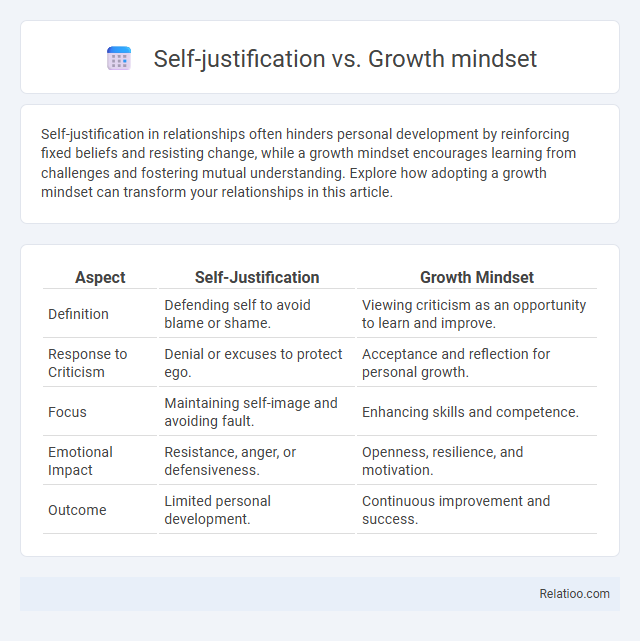Self-justification in relationships often hinders personal development by reinforcing fixed beliefs and resisting change, while a growth mindset encourages learning from challenges and fostering mutual understanding. Explore how adopting a growth mindset can transform your relationships in this article.
Table of Comparison
| Aspect | Self-Justification | Growth Mindset |
|---|---|---|
| Definition | Defending self to avoid blame or shame. | Viewing criticism as an opportunity to learn and improve. |
| Response to Criticism | Denial or excuses to protect ego. | Acceptance and reflection for personal growth. |
| Focus | Maintaining self-image and avoiding fault. | Enhancing skills and competence. |
| Emotional Impact | Resistance, anger, or defensiveness. | Openness, resilience, and motivation. |
| Outcome | Limited personal development. | Continuous improvement and success. |
Understanding Self-Justification
Understanding self-justification involves recognizing how individuals rationalize their actions or beliefs to protect their self-esteem, often resisting change or admitting mistakes. In contrast, a growth mindset embraces challenges and views failures as opportunities for learning and improvement, fostering adaptability and personal development. Focusing on self-justification highlights cognitive biases that hinder progress, emphasizing the importance of awareness to shift towards a growth-oriented perspective.
What Is a Growth Mindset?
A growth mindset is the belief that abilities and intelligence can be developed through dedication and hard work, promoting continuous learning and resilience. Unlike self-justification, which involves defending one's actions to preserve self-image, a growth mindset encourages embracing challenges and learning from mistakes. You can enhance your personal and professional development by adopting a growth mindset and overcoming the limitations imposed by self-justification.
The Psychology Behind Self-Justification
Self-justification involves defending one's actions or beliefs to maintain self-esteem, often leading to cognitive dissonance when confronted with conflicting evidence. In contrast, a growth mindset encourages embracing challenges and learning from mistakes, fostering adaptability and personal development. Understanding the psychology behind self-justification helps you recognize defensive behaviors and shift towards a growth mindset for improved decision-making and resilience.
Fixed vs. Growth Mindset: Key Differences
Self-justification reinforces a fixed mindset by encouraging individuals to defend their mistakes and avoid accountability, thereby limiting learning and personal growth. In contrast, a growth mindset embraces challenges and views failures as opportunities to develop skills through effort and persistence. Recognizing these key differences highlights the impact of mindset on motivation, resilience, and long-term success.
How Self-Justification Hinders Progress
Self-justification reinforces fixed beliefs by defending past actions and decisions, limiting openness to feedback and learning opportunities essential for growth. This cognitive bias obstructs the development of a growth mindset, which emphasizes adaptability, effort, and embracing challenges for continuous improvement. Consequently, self-justification hinders progress by blocking the reflective processes necessary for personal and professional development.
Benefits of Embracing a Growth Mindset
Embracing a growth mindset transforms challenges into opportunities for personal development, allowing you to view failures as valuable lessons rather than threats to your self-worth. Unlike self-justification, which often hinders progress by defending past choices, a growth mindset encourages continuous learning and adaptability critical for long-term success. This mindset enhances resilience, promotes innovation, and cultivates motivation, empowering your ability to overcome obstacles and achieve higher performance levels.
Recognizing Self-Justifying Behaviors
Recognizing self-justifying behaviors involves identifying patterns where individuals protect their ego by rationalizing mistakes instead of learning from them. A growth mindset, by contrast, embraces challenges and views failures as opportunities for improvement, encouraging continuous personal development. You can foster resilience and adaptability by shifting focus from self-justification to cultivating a growth-oriented perspective.
Transforming Self-Justification into Learning Opportunities
Transforming self-justification into learning opportunities requires shifting from defending ego to embracing a growth mindset, which prioritizes effort and improvement over validation. Recognizing self-justification as a barrier to personal development enables individuals to reframe mistakes and criticism as valuable feedback for skill enhancement and resilience building. This cognitive shift accelerates adaptability and fosters continuous learning, essential for both academic achievement and professional success.
Practical Strategies to Foster a Growth Mindset
Embracing a growth mindset involves recognizing mistakes as opportunities for learning rather than threats to your self-image, contrasting with self-justification, which often blocks personal development. Practical strategies to foster a growth mindset include setting specific learning goals, seeking constructive feedback, and reframing challenges as chances to improve skills. By adopting these approaches, you can shift from defensive reasoning to a proactive attitude that enhances resilience and long-term success.
Building Resilience Through Mindset Shifts
Self-justification can hinder personal growth by causing you to rationalize failures instead of learning from them, while adopting a growth mindset encourages embracing challenges as opportunities to develop resilience. Building resilience involves shifting from defensive reasoning to viewing setbacks as essential feedback for improvement, which fosters adaptive coping strategies and persistence. Cultivating this mindset shift enhances your ability to recover from adversity and sustain long-term success.

Infographic: Self-justification vs Growth mindset
 relatioo.com
relatioo.com